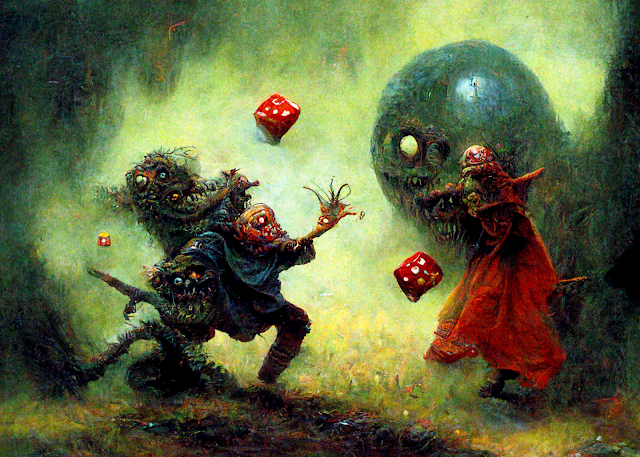I don't think I'd ever want to make an RPG without testing
it.
It's not that testing is completely necessary. You can make
something and put it out right away, and this might be the only option for
some.
But, if you can, there are huge benefits to be had. Every
game that I've tested has been improved by the process.
So let's take a trip to the experimental ludorium.
When I'm testing a game I'm looking at a few different
areas, but one looms large.
I'm looking for problems.
Problems, Not Solutions
So there's that corporate mantra which bosses like to
use:
"Don't bring me problems, bring me solutions!"
For playtesting I feel like the opposite is true. Tell the
people testing the game to bring you problems, not solutions.
I get the temptation. You've played in a playtest of a new
game, and maybe it's already got you excited. It was fun, but there are
definitely areas that need improving, and you've got some really cool ideas.
They should add this thing, or change this rule to work a different way.
I can only speak for myself, but personally I don't find
this useful at all, and at worst I find it a distraction.
Sometimes the ideas just don't fit with the goal of what I'm
trying to create, sometimes I just don't like them, but the worst are the ideas
that I actually like! There the temptation is to add them in, but nine times
out of ten the idea doesn't gel with the rest of the game, or the whole thing
starts to drift into something I didn't want it to be.
For me, the best feedback is "here's a list of problems
I had with the game".
Now I'm only human, so I love getting a list of things they
like, and a huge list of problems can feel like a gut punch, but we're here to
do the difficult stuff, right? We don't want to make any old game, we want to
make it good.
Imagine you get this list back:
- I
wasn't really sure what my character was supposed to do
- The
rules for how you level up felt confusing
- I
don't know why you'd ever choose to wear armour, it feels like it makes
you more vulnerable
Now one part of your brain yells:
- Look,
you go searching for treasure you idiot, it's right there in the first
line of the game
- It's
waaaaay simpler than other games, so you must have just not been paying
attention properly when I explained it
- No
I've obviously tested the numbers on this and have attached a formula to
prove that armour makes you 32.33 (repeating of course) percent tougher
And another part screams:
- Oh,
right, well I've added an Objective system now so each character always
has 3 Goals they're trying to achieve and when they tick them off they get
1 point toward their Progress Tracker
- I've
stripped this down now so you just level up at the end of each session no
matter what, I'm so sorry
- Armour
now offers double the previous protection against all weapons and immunity
to unarmed attacks
But instead, say thanks for the feedback, and let them know
it's been noted. Add it to a collated document of feedback and go do some more
tests if you can.
Remember you can add to this list of problems! Maybe in
running the game you got tired of flipping between distant pages, or you kept
forgetting a certain rule existed. GM problems are also valid, throw them on
the pile.
A little later, when you sit down to work on the game, open
the feedback document and look at the problems. Look for patterns. Take
everything on board, but take nothing as gospel. Condense the list down to a
few overarching problems if you can.
Then go to work on them with your own solutions, in your own
voice, remembering the vision you have in mind for your game.
Their problems. Your solutions.
-----------------------------------------------------------------------------------
This post was originally sent as a reward to all Patreon supporters, and is released freely on this site the week after its original publication.




